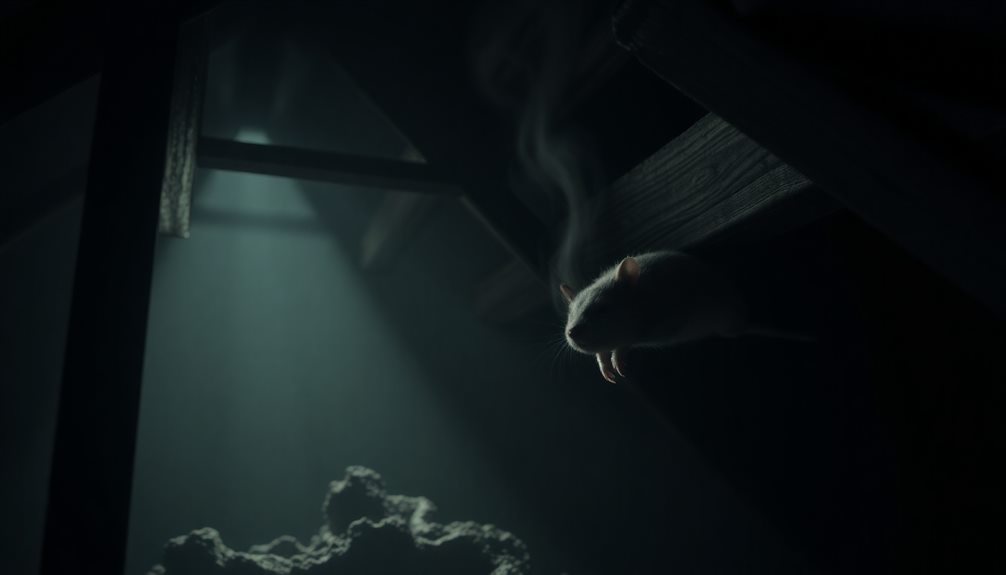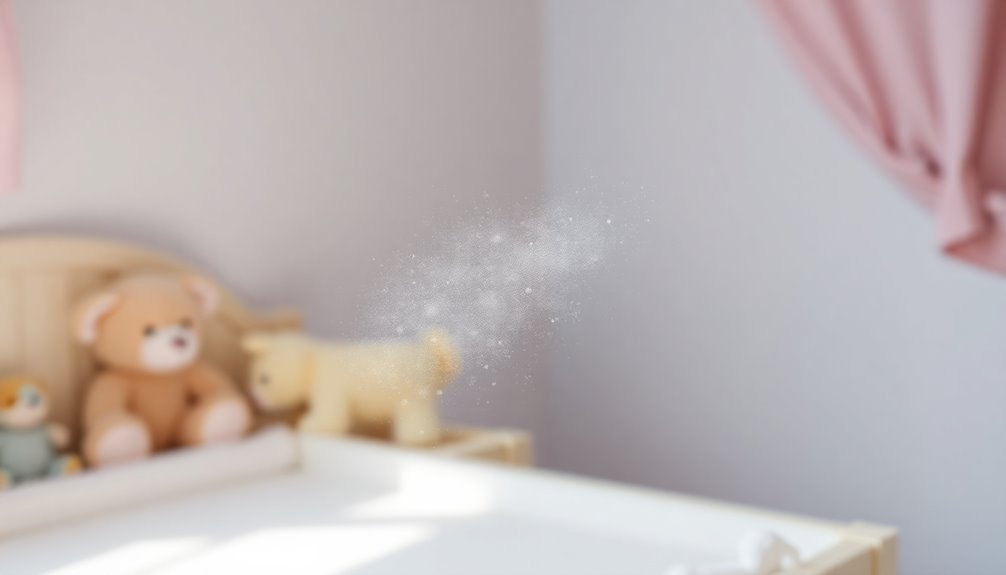A dead rodent smells pretty awful, like a strong mix of decay that'll make you feel queasy. The scent is a blend of rotting meat and sourness, almost like spoiled food. When a rodent dies, it releases foul odors that cling to walls and furniture, making your home feel uncomfortable. You might catch a whiff in hidden spots like attics or basements, where they love to hide. It's important to locate and remove the source quickly, not just for your nose, but for your health too. Stick around to learn how to tackle the issue effectively!
Key Takeaways
- The smell of a dead rodent is foul and decaying, reminiscent of rotting meat mixed with sourness.
- This pungent odor can linger in hidden areas like walls, attics, or basements, making it difficult to locate.
- Decomposition releases compounds such as putrescine and cadaverine, contributing to the strong, unpleasant scent.
- The smell can evoke strong emotional reactions, including fear and disgust, often associated with decay and misfortune.
- Presence of a dead rodent poses health risks from bacteria and parasites, necessitating careful removal and cleanup.
Introduction
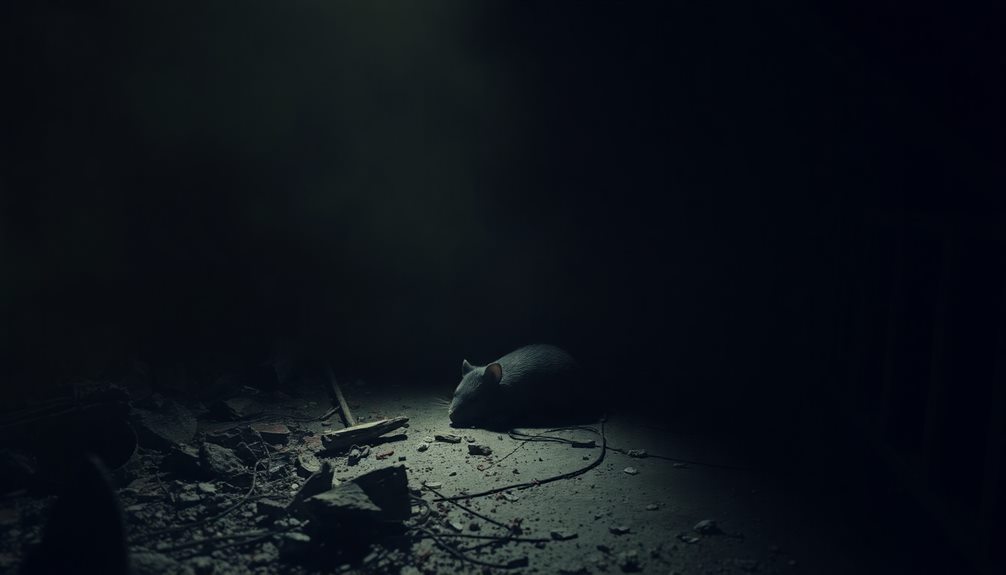
When you first notice a dead rodent smell, it can be unsettling and overwhelming. You might find yourself crinkling your nose and searching for the source of the odor. It's not just any smell; it's a strong, pungent scent that seems to cling to the air around you. You might wonder how something so small can create such a noticeable presence in your home.
This smell usually means that a rodent, like a mouse or a rat, has passed away somewhere nearby. The smell can linger because rodents often hide in walls, attics, or crawl spaces. Imagine the surprise when you realize that this little creature can cause such a big problem!
If you're dealing with this situation, you're not alone. Many people encounter this unpleasant experience, and understanding it's the first step toward resolving the issue.
You'll want to act quickly to locate the source and eliminate both the smell and the problem. Don't worry; you can tackle this challenge! Grab some gloves, gather your courage, and let's dive into the steps needed to restore freshness to your space. You've got this!
Description of the Smell

The smell of a dead rodent is unmistakable and can be described as a foul, decaying odor that permeates the air. As you encounter this scent, you might feel a wave of nausea wash over you. It's strong and unpleasant, almost like a mix of rotting meat and something sour. You may notice it lingering in corners or hiding behind furniture, making it all the more disturbing.
Imagine walking into a room and being hit with this overwhelming stench. You might wrinkle your nose or cover your mouth, instinctively reacting to the foulness. The odor can remind you of spoiled food, with a pungent sweetness that makes it even more alarming.
It's the kind of smell that clings to your clothes and hair, making you want to step outside for fresh air. If you've ever caught a whiff of something similar, you know it doesn't just go away; it settles in and stays.
You might find yourself searching for the source, hoping to rid your space of this awful smell. Trust me, once you smell it, you won't forget it anytime soon!
Source and Composition

Finding the source of that unbearable smell often leads you to the unfortunate discovery of a dead rodent. When a mouse or rat dies, its body starts to break down, releasing a mix of chemicals. You might notice a pungent odor that's hard to ignore. This smell mainly comes from decaying flesh, which produces compounds like putrescine and cadaverine. These compounds are what make the scent so off-putting!
As the decomposition process continues, bacteria and enzymes play a big role in breaking down the rodent's body. They release even more gases, adding to the stench. If you've ever caught a whiff of something rotting—like spoiled food—you can imagine how intense this smell can be.
The environment around the dead rodent can affect the scent too. For example, if it's warm and humid, decomposition happens faster, making the smell stronger.
Finding the source can be a bit of a treasure hunt, but it's crucial for getting rid of the odor. Once you locate the rodent, you can take steps to clean up and eliminate that awful smell for good!
Typical Scenarios or Environments
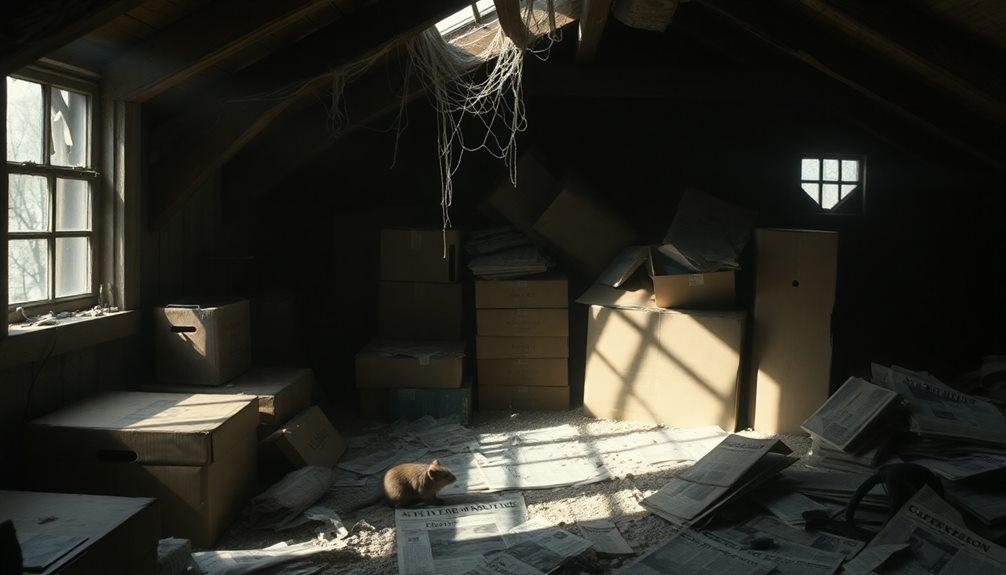
Unpleasant surprises often lurk in unexpected places, and dead rodents are no exception. You might encounter that awful smell in your attic, basement, or even the walls of your home. These sneaky little critters often find cozy spots to nest, making it easy for them to go unnoticed until it's too late.
When they pass away, the smell can be overpowering, wafting through your living space like a ghostly reminder of their presence.
Picture yourself exploring your attic, searching for old holiday decorations. Suddenly, you catch a whiff of something foul. If you find yourself in this scenario, your heart might race as you realize a rodent has bitten the dust nearby.
Basements are another common place where you might stumble upon this stench, especially if it's dark and damp.
While you mightn't want to think about it, garages can also hide the odor of a dead rodent. If you've left some clutter around, it can become a hiding spot for these animals.
Emotional or Cultural Associations

Encountering the smell of a dead rodent can evoke strong emotional reactions, often rooted in fear and disgust. You might find yourself crinkling your nose or feeling a shiver run down your spine. This smell isn't just unpleasant; it can remind you of decay and loss, making you think about the fragility of life.
Culturally, the scent of a dead rodent might symbolize misfortune or bad luck. Some cultures associate it with omens, linking the smell to negativity or warning signs. You may even recall stories or folklore where rodents are seen as pests or harbingers of illness, deepening that sense of unease.
In your own experiences, the smell might trigger memories of old buildings, abandoned places, or even your childhood home if it had unwelcome guests.
It's fascinating how such a simple scent can stir up vivid recollections and feelings, connecting you to your surroundings in unexpected ways.
Health or Safety Considerations
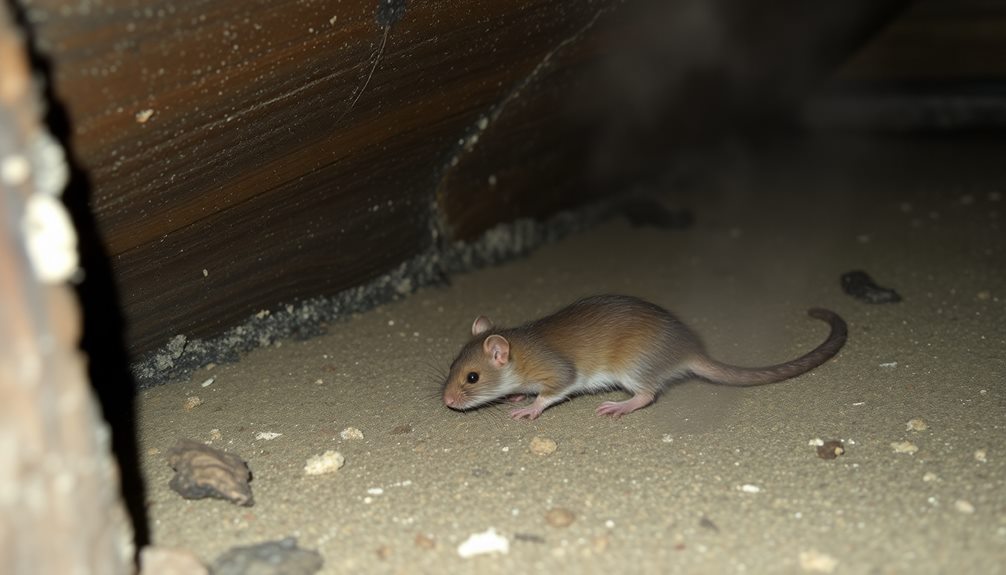
When you catch a whiff of a dead rodent, it's crucial to recognize the potential health risks involved. The smell itself can indicate the presence of bacteria and parasites, which can pose serious health threats. If you're in an area with a dead rodent, you might be at risk of inhaling harmful pathogens. This is especially concerning for kids, pets, or anyone with a weakened immune system.
You should also be aware that decomposing animals can attract other pests, like flies and other rodents. These pests can carry diseases too! So, it's wise to act quickly.
Make sure to wear gloves, a mask, and even goggles if you decide to remove the carcass yourself.
If you're unsure about handling it, don't hesitate to call pest control. They've the right tools and training to safely remove the animal and clean up any mess.
Remember, it's better to be safe than sorry! Keeping your home free from such odors not only feels better but also keeps your family healthy.
Take action as soon as you detect that smell, and you can protect your space from unwanted health issues.
Final Thoughts

Taking immediate action when you notice the smell of a dead rodent is vital for protecting your health and home. That awful odor isn't just unpleasant; it can also be a sign of potential health risks. You wouldn't want that smell lingering around, would you?
First, try to locate the source of the smell. It could be hidden in walls, attics, or under floors. Wear gloves and a mask for safety, and don't hesitate to ask for help if you feel uneasy.
Once you find the rodent, dispose of it properly. It's also a good idea to clean the area with disinfectant to eliminate any germs.
After removing the rodent, you should consider preventive measures. Seal any cracks or holes in your home to keep more rodents from entering.
Regularly check for signs of infestations, and keep your space clean and clutter-free.
Frequently Asked Questions
How Long Does the Smell of a Dead Rodent Last?
The smell of a dead rodent can linger for days to weeks, depending on factors like temperature and ventilation. You'll want to remove it promptly and clean the area thoroughly to minimize the odor.
Can Other Animals Cause a Similar Odor?
Yes, other animals can cause similar odors. When they die nearby, you might notice a strong, unpleasant smell. It's essential to identify the source quickly to address any potential health risks or sanitation issues.
Are There Home Remedies to Mask the Smell?
You can try using baking soda or vinegar to neutralize odors. Activated charcoal also absorbs smells effectively. Place these remedies in the affected area, and you'll notice a significant reduction in unpleasant scents.
What Should I Do if I Find a Dead Rodent?
If you find a dead rodent, wear gloves and a mask for safety. Carefully dispose of it in a sealed bag, then clean the area with disinfectant. Finally, wash your hands thoroughly.
Does the Smell Change With Different Rodent Species?
Yes, the smell can change with different rodent species. Some might have a stronger odor due to their size or diet. You'll notice variations that can be quite distinct, making identification easier in certain situations.
